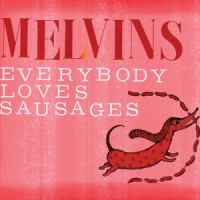By my count, the Melvins have already officially released 42 covers of other composers, and there are probably another five or more that I am missing. Indeed, their seminal Lysol album is about 50% covers and The Crybaby is just over that ratio. But, despite their penchant for reworking other people's music, Melvins covers never have really felt like covers, but rather, Melvins tunes that were written by other people. The question is then, on Everybody Loves Sausages, the band's first all covers album, can they maintain the originality that seeps through their reworkings for an entire album?
Yes, yes they can. And how.
Wisely, the band avoid covering the most obvious picks of Kiss and Sabbath. In fact, in recent years, the band have expressed some frustration at being so linked to those groups. Instead, Sausages provides the band's education through a selection that is surprising, but still makes a lot of sense.
On their cover of Venom's "Warhead", Neurosis' Scott Kelly takes the vocals and the band morph the song from a proto-thrash rocker into a heavy, lumbering creature. As Kelly assumes a craggily, warlock voice, the band smas down so hard that it feels like they reach what Venom were grasping for in 1984.
But on the other end of the spectrum, the band take a crack at the pre-war classic "Black Betty." Following on Ram Jam's lead, Melvins drop in a driving, hard rock boogie riff. Where the song used to be lead a clomping lamentation, now Buzz Osborne howls out "Ram ba lam- BLACK BETTY" and the band break into some wild riffage that modern rock has forgotten in recent years.
Really though, two things keep elevate this release from "songs that we like" to an expression of what makes the Melvins so unique. Firstly, the band exist in at least three formations on this release: Several tracks are by the four-piece Melvins, several tracks are by Melvins Lite, which includes Trevor Dunn on acoustic bass, and a few tracks include the Kevin Rutmanis bass formation. But, to congeal the disparate sections, the band bring in a group of friends which crop up over the release to keep it fluid. J.G. Thirlwell shows up on Bowie's "Station to Station." Melvins associate Haze XXL does a hilarious, but also reverent, cockney accent on the Jam's "Art School." Blondie's Clem Burke fittingly shows up on a cover of The Kinks' "Attitude" and transforms into in a punk smasher.
Secondly, and most strikingly, is how much the band inject their own personality into the songs. On their cover of Queen's "You're My Best friend," which includes Caleb Benjamin of Tweak Bird, that inherent creepiness which is in so many Melvins tunes permeates. Freddie Mercury's original take was always somewhat tongue in cheek as he cooed in his breathless voice; the Melvins take raises up the kitsch just a little bit. But, there is a world of difference from Mercury chirping odes to friendship and the Melvins, who seem to have a black tar in their core no matter what they do, doing the same thing, particularly where the Melvins version is decorated with beeping sound effects that could have come from Super Mario Brothers.
However, the two nine-plus minute songs that anchor this release are what make it such a rewarding piece. The aforementioned take on Bowie's "Station to Station" maintains all three sections of the original but get wilder and more threatening with each, without going over the top. While the rhythm section crunches forward and Thirwell pleads out "It's too late," Osborne fills in the background with a amorphous haze of metallic clanking, which makes it feel like the entire band are trudging through a white storm. As Thirwell grows more desperate with each cry, the storm gets heavier and sharper until the end when the entire thing is ripped apart.
And then there is Jello Biafra and The Melvins' take on Roxy Music's "In Every Dream Home a Heartache," which might be the greatest cover the band have ever done, giving composer Brian Ferry a real run for his money and maybe even leaving him gasping in the dust. The original features Ferry speaking in an emotionless meter, applying a paean to his blow up doll. But here, Jello steals the show for the first half and the Melvins steal it back for the second. Blowing the song up to a necessary nine minutes, the band open with a ghostly synth and distant clacking. Then Jello appears, but where Ferry was detached, Jello assumes an Oscar Wilde-ish, wavering, creeping voice. If voices were handshakes, this one would be wet and limp. Through his voice alone, Jello creates the image of that guy you see on the street that always wears stained sweatpants and and has a '70s mustache that creeps you out, but you're not sure why and you definitely don't want to learn why. Then, just as Jello creeps closer and closer through one of his greatest vocal takes, on the second half, the band snaps the song from a plodding, ghost creep to a parade of crushing riffs. Osborne and drummer Dale Crover strike back, meaner and harder with each measure, getting nastier while Biafra gets louder and more frantic screaming out "Oh those heartaches!" Without demeaning their fantastic original compositions, this is one of the finest Jelvins recordings, and even one of the greatest moments in both of their careers. Simply marvelous.
The title of the album is likely a bait to the old idiom that "you don't want to see the sausage being made." Only the Melvins could take a process that remains in the shadows for its grossness and then project light on it in order to show all the wonderful and interesting things going on in the slaughterhouse.
